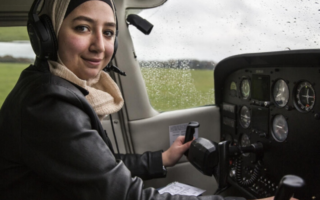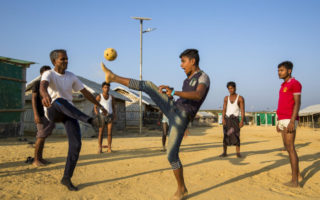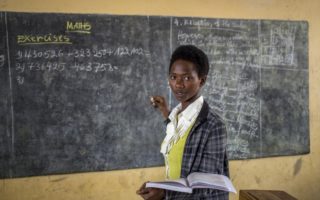
Refugee students meet in Berlin, Germany, on World Refugee Day 2019.
© UNHCR/Antoine Tardy
A three-day gathering on refugees kicks off in Geneva, aiming to bolster the global response and foster inclusion.
By UNHCR staff in Geneva
The first Global Refugee Forum comes at the end of a tumultuous decade in which the number of refugees worldwide has doubled to well over 25 million.
From 16-18 December, the international community is coming together to announce bold, new measures to ease pressures on host countries, enhance refugee self-reliance, and find lasting solutions for those uprooted from their homes by wars and persecution.
Check back here throughout the day for updates:
Refugee boxer gives knockout performance
Refugee boxer and Olympic hopeful Farid Walizadeh has been helping Forum participants to understand how sport can positively impact refugee lives.
Being a refugee thinking about the Olympics has given me the confidence to hope again.’ A knockout performance from Olympic hopeful Farid Walizadeh at the #RefugeeForum on how sport can change the lives of refugees. pic.twitter.com/qo8okzKHDG
— Stephen Pattison (@StephenPat1) December 16, 2019
In a session run in collaboration with the Olympic Refugee Foundation (ORF) and the International Olympic Committee, participants listened to Walizadeh’s experience and discussed ways of ensuring that all refugees have the opportunity to play sport.
“It is our dream that, by 2024, 1 million young refugees and forcibly displaced young people have access to safe sport,” said Jojo Ferris from the ORF.
Walizadeh, who currently has an amateur record of 50 fights with only three defeats, combines his training with architecture studies at university in Portugal.
“Being a refugee thinking about the Olympics is like a dream,” he said. “After losing everything I also lost hope, but this has given me the confidence to hope once again. Every morning, when I wake up at 5am to train, I think: ‘just one day more to show I can do it’.”
Helping refugees to help themselves
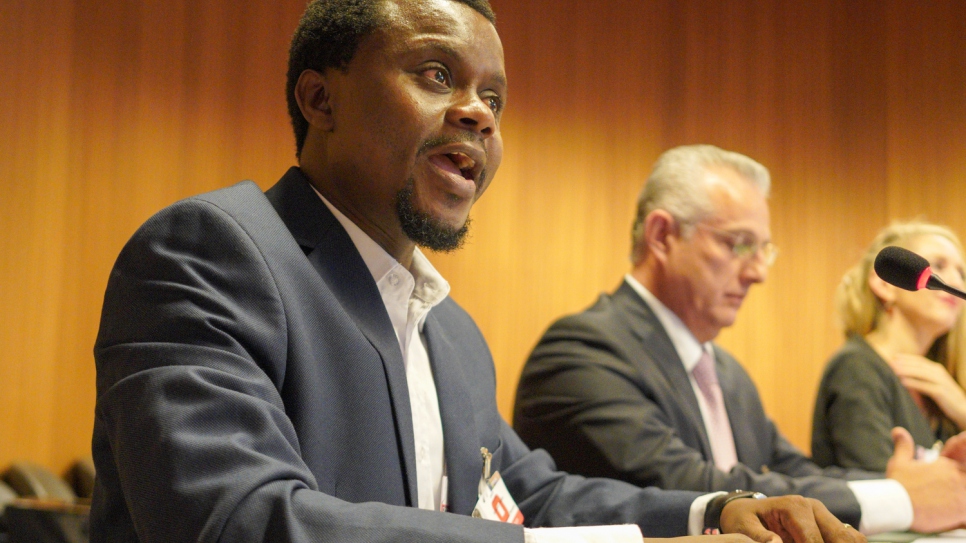
Robert Hakiza, who fled the Democratic Republic of the Congo, speaks at the Forum in Geneva. © UNHCR/Markel Redondo
With record numbers of people worldwide forced to flee their homes, finding ways to help refugees support themselves is a better and more financially sustainable approach than relying on traditional hand-outs.
This was the message from participants in a session on boosting refugee self-reliance, which featured speakers from business, government and refugee communities.
“There was a time when I thought donating clothes and giving financial contributions would be enough,” said Tadashi Yanai, CEO of Fast Retailing, UNIQLO, who spoke in a video shown during the session.
“By creating such opportunities as vocational training, education and employment, I would like to support refugees holistically. Considering the increasing number of refugees, I believe this is the right thing to do.”
UNIQLO has programmes to help refugees get jobs in their stores, and speakers urged more private organisations to work with governments and local authorities to create opportunities for refugees to support themselves financially.
Robert Hakiza is Executive Director of Young African Refugees for Integral Development, based in Kampala, Uganda, where he has lived as a refugee for the past 20 years after fleeing the Democratic Republic of the Congo.
He said that for him and the refugees he works with, self-reliance means being able to come up with your own solutions to the problems you face. Bringing together refugees and the people they live and work alongside is key to changing not only people’s perception of refugees, but also integrating them into their local communities.
The point was echoed by Roman Alberto Cepeda Gonzales, Secretary of Labour in the Mexican State of Coahuila. For him, the first step is to help refugees and internally displaced people feel like they are part of their local community and its social life. This makes it easier for refugees to then find work and build a long-term future for themselves.
Brighter futures: early childhood development in crisis settings
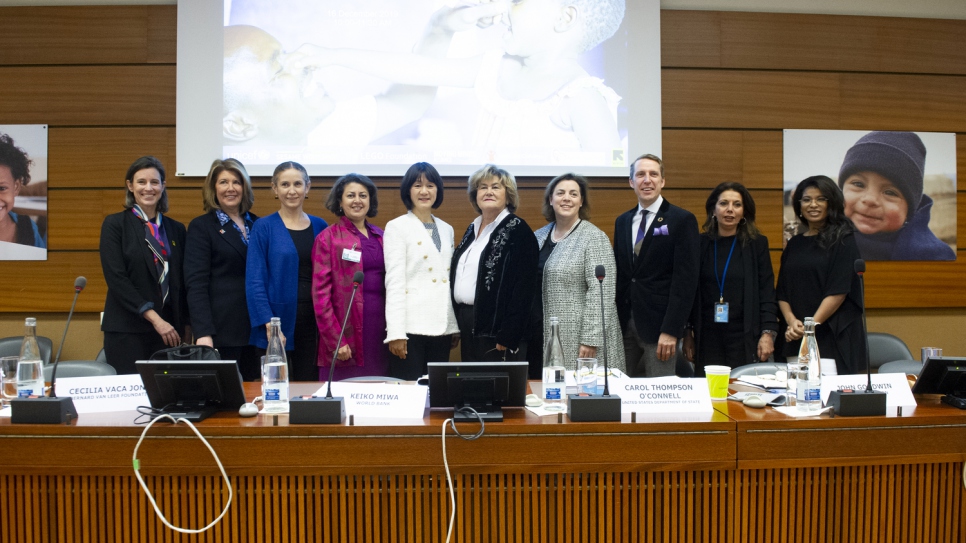
Participants gather to discuss ways of bringing brighter futures to refugee children. © UNHCR/Violaine Martin
Over half of the world’s refugees are children. Many will spend their entire childhood far from home, sometimes separated from their dear ones. They may have witnessed or experienced brutal violence and, in exile, are at risk of abuse, neglect, exploitation, trafficking or military recruitment.
The adverse impacts of conflict and displacement are especially salient during the early years of life when a child’s rapidly developing brain is exceptionally sensitive to environmental influence. There is an urgent need to prioritize and invest in young children and caregivers in refugee settings.
Children are especially vulnerable, but also incredibly resilient. By learning, playing and exploring their skills, they can find ways to cope, drawing strength from their families and communities. Collective action can prevent depriving an entire generation of opportunities and hope.
This was the focus of a spotlight session this morning on bringing brighter futures to refugee children, which showcased existing models of early childhood development programming in contexts of displacement, aligned with the Global Framework for Refugee Education.
“In the context of emergencies, young children face several visible and invisible challenges,” said Najat Maalla M’jid, Special Representative of the Secretary-General on Violence Against Children. “Children who experience extreme and adverse stress in their earlier years are at greater risk of developing cognitive, behavioral and emotional difficulties, which also reduces and delays their overall development process. If we fail to invest in providing integrated and multi-sectoral response to children, families and communities, we will pay the price later in higher social costs and lost economic opportunities.”
John Goodwin, CEO of the LEGO Foundation, which recently pledged a US$100 million grant to bring learning through play to refugee children impacted by protracted humanitarian crises in the Horn of Africa, stressed the importance of bringing “hope to people who find themselves in humanitarian crises, through quality play-based early development to every child in such circumstances.” This can be achieved, he said, by leveraging “the resources available, capturing what works and replicating it, to give a message of hope for those who are in displacement.”
Many states, international organizations, academia and civil society representatives pledged their support to education and early childhood development for both refugees and host communities, including the Intergovernmental Authority on Development, Save the Children, UNICEF, the University of Virginia and World Vision.
Geneva flies the flag for the Global Refugee Forum
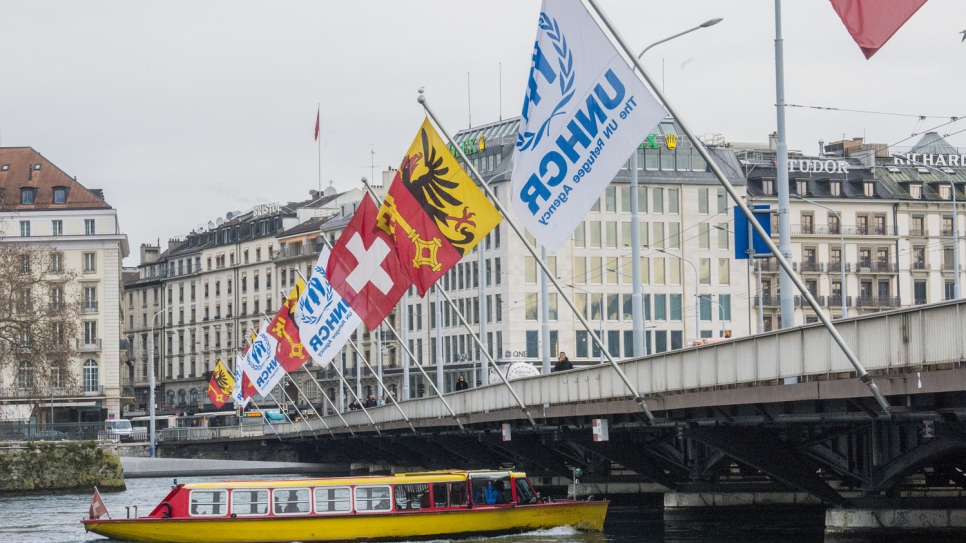
Flags on the Pont du Mont Blanc, Geneva, mark the opening of the Global Refugee Forum. © UNHCR/Mark Henley
Highlighting Switzerland’s role as co-hosts of the Forum together with UNHCR, the City of Geneva marked the start of the event this morning with a colourful display on the Pont du Mont Blanc in the city centre.
Global Refugee Forum flags flew alongside those of the Swiss Confederation and the Canton of Geneva along the length of the bridge, which marks the point where the Rhône leaves Lake Geneva.
From the Global Refugee Forum comes a global message: #EveryoneCounts
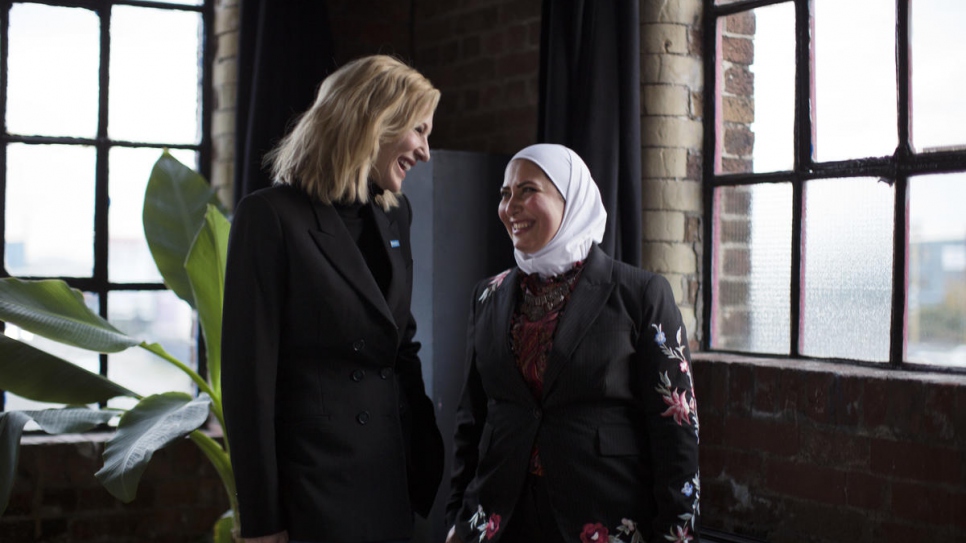
UNHCR Goodwill Ambassador Cate Blanchett with Syrian refugee and business woman Razan Alsous. © UNHCR/Caroline Irby
In this busy media world, what’s the best way to communicate the aims of the Global Refugee Forum to a global audience?
The answer: Tell stories of the strength and resilience that refugees can bring to their new communities. And build understanding and awareness that there are solutions for refugees, and that everyone has a role to play in finding and developing those solutions.
And how best to reach a global audience with messages these days? Use social media.
That’s the rationale behind the #EveryoneCounts campaign, launched by UNHCR, the UN Refugee Agency, ahead of the Global Refugee Forum.
The social media campaign rallies support behind the core message that “everyone has a role to play” in helping refugees. It also highlights how we can all help to counter xenophobia, intolerance and fear, and empower refugees to rebuild their futures.
Everyone has a part to play in helping refugees. What will yours be?#EveryoneCounts pic.twitter.com/YYRP7QmZNt
— UNHCR, the UN Refugee Agency (@Refugees) December 16, 2019
Sesame Street heads to the Forum
The Forum is bringing together thousands of delegates from around the world including refugees, heads of state and government, UN leaders, international institutions, development organizations, business leaders and …. Sesame Street.
Grover — in UN blue — made his way to the venue in Geneva on Sunday.
https://twitter.com/Refugees/status/1206243499898744834?ref_src=twsrc%5Etfw
Finding solutions for refugees and host countries
The aim of the Forum is to generate new approaches and long-term commitments from a variety of actors to help refugees and the communities in which they live. One of the priority areas for action is education, in order to help more young refugees like Sidra, a star student from Syria, to fulfil their potential.
https://twitter.com/Refugees/status/1206219614021132294?ref_src=twsrc%5Etfw
Refugee crafts go on sale at Geneva Christmas market
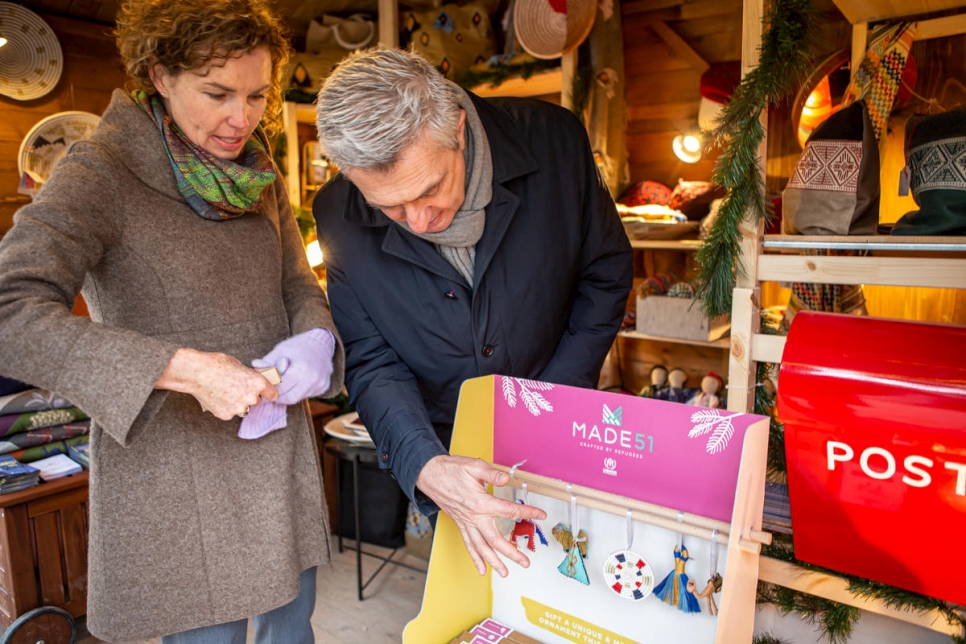
UNHCR’s Heidi Christ and UN High Commissioner for Refugees Filippo Grandi browse refugee handicrafts at a Christmas market in Parc des Bastions, Geneva. © UNHCR/Pierre Albouy
Captivating lampshades, bold jewellery and intricately crafted boxes are among scores of products made by refugee artisans that went on sale in Geneva in the run up to the Global Refugee Forum.
Supported by UNHCR, the UN Refugee Agency, products made by refugees from about a dozen countries worldwide have gone on sale at the city’s Noel aux Bastions and at the local fashion store Bongénie Grieder.
It was made possible by MADE51, a UNHCR initiative that seeks to connect talented displaced artisans from countries as diverse as Afghanistan, Burundi, Mali, Somalia and Syria with international outlets for their goods.
Attending the outdoor market, UN High Commissioner for Refugees Filippo Grandi, thanked Swiss and local partners for helping to make it happen. He was particularly pleased by the interest shown by customers perusing the stalls.
“The presence of our MADE51 Brand at Noël aux Bastions, is a great opportunity to bring the stories behind the products and the concrete objectives of the Global Refugee Forum to the Swiss audience,” Grandi said.
The refugee artisans, who are all paid a fair wage for the work, use traditional processes such as hand-hammered copper and bronze to make bowls and bracelets, weaving baskets from grass, and knotting rugs.
“It is heartening to see how the Swiss public is responding to MADE51,” said Heidi Christ, UNHCR’s Global Lead for MADE51. “Customers are excited to have the opportunity to buy MADE51 products because they are beautifully crafted and make thoughtful gifts.”
She added: “By gifting, customers also spread the word to their friends and family that refugees can be talented contributors, if given the opportunity.”
For more information, please visit the Global Refugee Forum web page
Originally published on UNHCR on 16 December 2019



